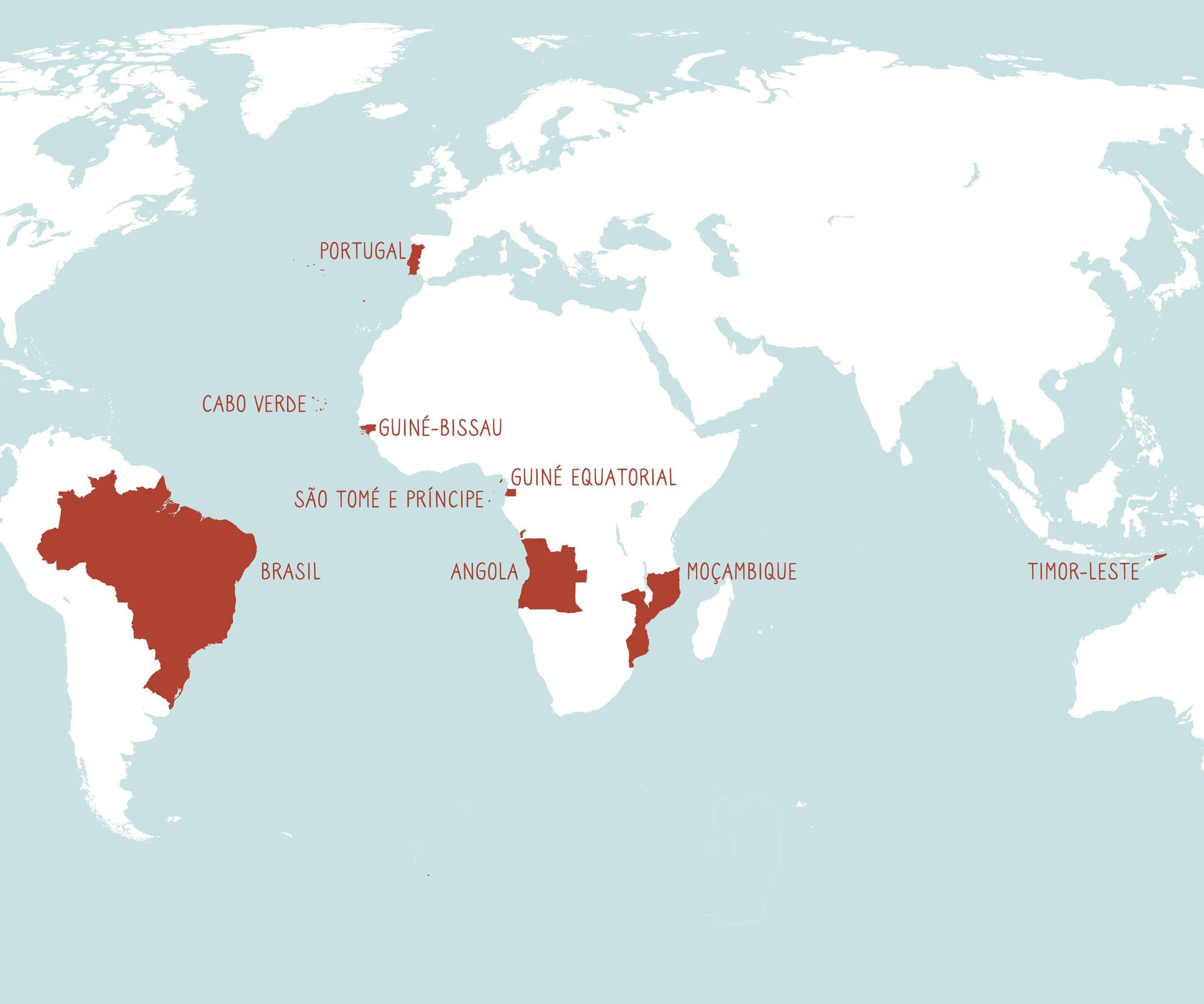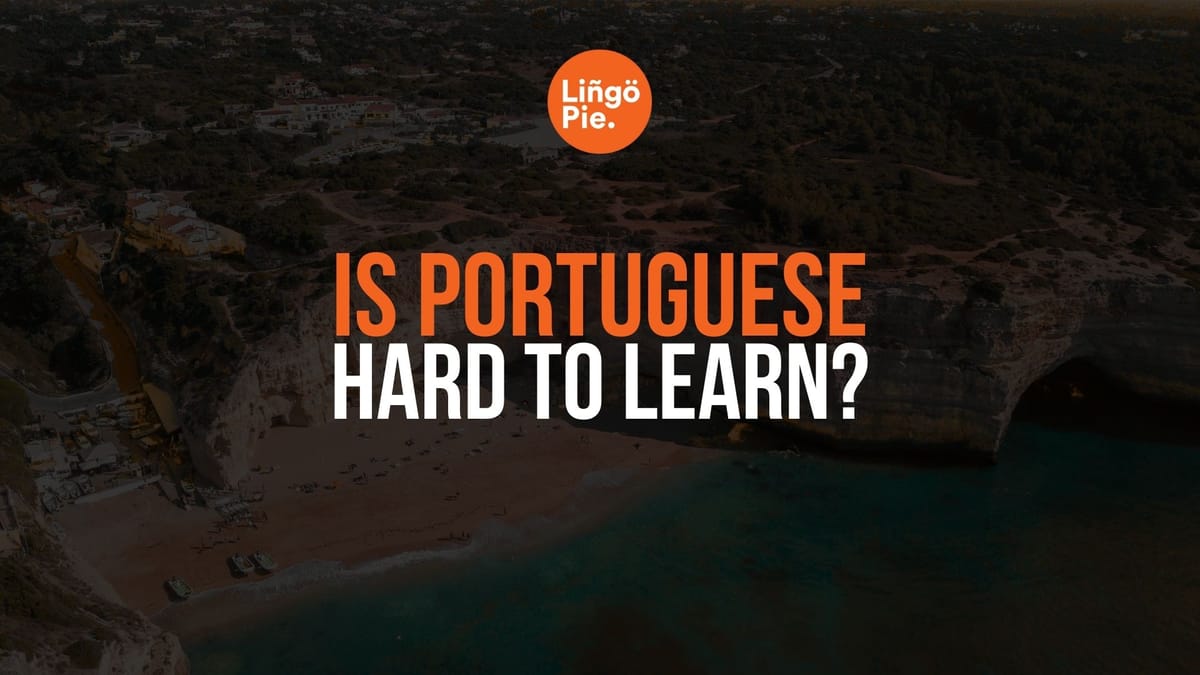When you're thinking about picking up a new language, there's always that moment where you find yourself typing into Google: "Is [language] hard to learn?" Maybe you’re curious about Portuguese because you're planning a trip to Brazil, dreaming of living in Lisbon, or just fascinated by the sound of it. If that's what brought you here, you're definitely not alone.
I've been down this road myself with Portuguese, and I'll be straight with you—it's been quite the journey. In this post, I'll share my honest thoughts about learning Portuguese based on my own experience, what makes it challenging (and surprisingly manageable), and some practical tips that actually helped me make progress.
- How To Learn Portuguese Fast? [Best 2025 Guide]
- Hello In Brazilian Portuguese: 13+ Easy Greetings To Use
- 7 Brazilian Documentaries On Netflix You Need To See

What Is Portuguese?
Portuguese is a Romance language that evolved from Latin when the Romans brought it to the Iberian Peninsula around 216 BC. It started as Vulgar Latin and began separating from other Romance languages in the 9th century as the Roman Empire collapsed. The language became officially recognized in the 13th century when Portugal gained independence and started using Portuguese instead of Latin for legal and government purposes.
The language spread globally during Portuguese exploration and colonization in the 15th and 16th centuries, reaching Brazil, parts of Africa, Asia, and other regions. Today, Portuguese is the official language of nine countries and spoken by around 260 million people worldwide.
How Many People Speak Portuguese?

Portuguese is spoken by approximately 264 million people worldwide, making it the 8th most spoken language globally. Around 236 million are native speakers, with Brazil accounting for over 200 million of them. The language serves as the official language in 10 countries across multiple continents:
- Angola
- Brazil
- Cape Verde
- East Timor
- Guinea Bissau
- Macau
- Mozambique
- Portugal
- São Tomé and Príncipe
Large Portuguese-speaking communities also exist in countries like the United States, Canada, and France due to migration.
How Many Varieties of Portuguese Are There?
Portuguese has two main standardized varieties: European Portuguese and Brazilian Portuguese. These differ significantly in pronunciation, vocabulary, and grammar, with European Portuguese being more conservative and Brazilian Portuguese having more open vowels and melodic intonation.
Both Brazil and Portugal have numerous regional dialects within their borders. Brazil features varieties like Carioca (Rio de Janeiro), Gaúcho (southern Brazil), and Nordestino (Northeast), while Portugal has Northern, Southern, and Insular (Azores and Madeira) dialects. Despite these differences, all varieties remain mutually intelligible, with distinctions more noticeable in speech than writing.
| Category | European Portuguese (EP) | Brazilian Portuguese (BP) |
|---|---|---|
| Pronunciation | Reduces final vowels: "cidade" sounds like "sid'da" | Full pronunciation: "si-da-je" |
| Vocabulary | autocarro (bus), pequeno-almoço (breakfast), fato (suit) | ônibus (bus), café da manhã (breakfast), terno (suit) |
| Grammar | Object pronouns after verb: "viu-me" (he saw me) | Object pronouns before verb: "me viu" |
| Address Forms | Uses "tu" informally, "vós" formally (rare) | Mostly uses "você" |
| Expressions | "Ficar de olho" (to watch closely) | "Ficar esperto" (to be alert) |
Is Portuguese Hard To Learn?
No, Portuguese is not hard to learn for English speakers. The Foreign Service Institute (FSI) and Lingopie rank Portuguese as a Category I language, which means it's among the easiest languages for native English speakers to master. In fact, reaching professional working proficiency requires only 23-24 weeks or about 575-600 hours of study, putting it in the same category as Spanish, French, and Italian.
From my personal experience, Portuguese feels approachable once you get past the initial pronunciation hurdles. The nasal sounds can trip you up at first, and the verb conjugations require practice, but the language has a rhythm that becomes intuitive over time.
Also, I found that understanding a bit of Spanish actually helped with vocabulary, though the pronunciation is quite different. I think that the biggest challenge is deciding whether to focus on Brazilian or European Portuguese.
What Makes Portuguese Hard To Learn?

While Portuguese might be classified as "easy" by the FSI, that doesn't mean it's without its challenges. Every language has its tricky spots, and Portuguese certainly has a few that can catch English speakers off guard. Here are the main hurdles you'll likely encounter on your Portuguese learning journey.
Nasal Vowels and Pronunciation
Portuguese pronunciation will mess with your head, especially those nasal vowels. Words like "não" (no) and "pão" (bread) contain sounds that simply don't exist in English. Your mouth needs to learn completely new positions. Most people sound like they have a cold when they first attempt these sounds.
European Portuguese adds another layer of complexity with vowel reduction. By vowel reduction, I mean syllables get swallowed or barely pronounced, making it sound quite different from the cleaner pronunciation you might expect from Spanish.
Verb Conjugations
Portuguese verb conjugations are hard to learn because verbs change form depending on who's doing the action, when it happened, and how certain you are about it. Each tense has six different endings, and there are more tenses than you probably want to deal with.
For example, the present tense conjugation of the regular verb "falar" (to speak) changes as:
- Eu falo (I speak)
- Tu falas (You speak)
- Ele/Ela fala (He/She speaks)
- Nós falamos (We speak)
- Vocês/Eles falam (You all/They speak)
Additionally, Portuguese has many irregular verbs like "ser" (to be), which do not follow predictable patterns, requiring memorization of unique forms for each tense and person. This complexity increases due to regional variations and different usages of pronouns, making verb conjugation a significant challenge for learners.
European vs. Brazilian Portuguese
The thing about learning this langauge is that you can't just say you're learning "Portuguese." You need to choose which variety to focus on, and they're different enough that your choice affects your entire learning path.
For instance, Brazilian Portuguese uses clearer vowel sounds and fuller pronunciation. European Portuguese drops vowels and consonants, making words sound compressed. When Brazilians say "cidade" (city), you hear every syllable clearly as "si-da-de." Europeans pronounce it more like "sid-de," swallowing the middle vowel entirely.
Then you also have to note that both varieties have different vocab. Brazilians say "ônibus" for bus while Europeans say "autocarro." Breakfast is "café da manhã" in Brazil but "pequeno-almoço" in Portugal.
As for grammar, Brazilians predominantly use "você" (you) with third-person verb forms. Europeans still use "tu" (you) with second-person conjugations in many regions. Object pronouns appear before verbs in Brazilian Portuguese ("me ajuda") but after verbs in European Portuguese ("ajuda-me").
So, How Hard Is Portuguese To Learn?
Portuguese is moderately difficult—not a walk in the park, but definitely doable for English speakers. You'll face some real challenges that you can't just brush off, particularly with pronunciation and grammar complexity. The nasal sounds will frustrate you initially, and the verb system is genuinely complicated with all its tenses and irregular forms.
What makes it manageable is the shared vocabulary with English and logical grammar patterns. You're not starting from zero like you would with completely unrelated languages. The writing system is familiar, sentence structure makes sense, and you can start recognizing words from day one.
Ready to Start Learning Portuguese?
Portuguese might have its challenges, but as we've seen, it's definitely one of the more approachable languages for English speakers. If you’re ready to learn once and for all, you must consider trying Lingopie.
Lingopie is a platform that teaches Portuguese through authentic TV shows, movies, and documentaries from Brazil and Portugal. With Lingopie, you'll learn from real conversations, pick up natural pronunciation, and get a feel for how Portuguese speakers actually talk. You can also pause, replay, and click on subtitles to understand new words in context, making it easier to grasp those tricky pronunciation patterns and grammar structures we discussed.
So what are you waiting for? Give Lingopie a try and see how much more natural and enjoyable your Portuguese learning journey can become!







![Is Lingopie Free? Plans, Pricing & Free Trial Guide [2026]](/blog/content/images/size/w300/2026/01/Is-Lingopie-Free.jpg)
![How To Gift Lingopie: One-Year vs Lifetime Subscription [GUIDE]](/blog/content/images/size/w300/2026/01/lingopie-gift-subscription.jpg)
![What is Lingopie? Complete Platform Guide [2026]](/blog/content/images/size/w300/2026/01/What-is-Lingopie.jpg)